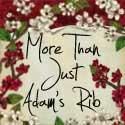The concept that my life is bound to your choices doesn't strike me as that far fetched. How else do you explain my grocery bill each week. I certainly don't purchase any more food than I did a year ago. If anything, I purchase less. Still, with OPEC driving up the price of oil, drought in the mid West, an unseasonably cold Spring up north, and inflation affecting everything from toilet paper to crayons, it just makes logical sense to believe that not only am I effected by my environment but also that my choices affect you and your choices affect me.
Several years ago, a movie The Butterfly Effect espoused much the same view wherein small, seemingly inconsequential choices ultimately have seemingly unrelated (and sometimes catastrophic) results down the road.
In Chris Brauns' newest novel Bound Together: How We are Tied to Others in Good and Bad Choices, he makes a similar argument. Brauns' first two chapters are interminably tedious as he approaches his premise from the hypothesis that most people don't truly believe in what he refers to as the "principle of the rope," that we are inextricably bound to each other in good and bad.
Yet, once he feels the reader is convinced she is "roped" to others' choices, Brauns' narrative improves significantly as he explains how this principle plays out in the doctrine of original sin, wherein all mankind is "roped" to Adam's bad choice. Despite being "roped" to sin, mankind has a choice to burn that rope and join himself by a stronger rope to Jesus Christ.
Here's the rub, though: to be bound to Christ, one must be bound to the gospel of Christ, which requires that one first know the true gospel, the Word of God. Additionally, to be bound to Christ, one must be bound to each other in Christ in a local New Testament Church. As Brauns says of this need for Christian community,
"God's plan is not to change us as individuals; the principle of the rope means that our union to Christ also unites us to others who are connected to him in faith. As a result of our union, we are mortared into Christian community. The principle of the rope means that God will use the relationships we have with others in the body of Christ to change and transform our lives. God will use our new connections to confront our sinful habits, remind us of truth, and bring healing and victory to our lives. But this can only happen if we are roped into Christian community and involved in a Christ-centered local church" (p. 87).
Brauns concludes in his last chapter (which is, by far, the best writing in the entire book) with a call to avoid the trap of radical individualism, warning: "If we Westerners continue to see ourselves as islands, the future will
be very dark. Cultures and countries cannot flourish apart from a deep
recognition of solidarity that only Christ and his church can make
happen" (p. 163).
The interesting thing is that this principle is important not just for Christians. Anyone's life can benefit from understanding how his actions affect others and how others' actions affect him. Yet, if a person is to reach the fullest plan God has for him in this life, s/he will only be as effective as possible when linked together through the gospel of Christ within a Christian community.
Chapters 4, 5, and 10 are the best in terms of content, but in all honesty, Chapters 6 - 9 were exhausting to read. These chapters do a good job of applying the principle of the rope by using Scripture to explain how one's joy, marriage, family, and even fear of death are better understood in light of one's belief that everyone's decisions affect another. Still, they are what I'll call "plodding" chapters, which I had to slog through.
While this is not likely a book that will radically change your life, Brauns' thesis is valid and his warnings about the dangers of radical individualism along with the strong need for Christian community are extremely important in our present culture.
Tuesday, May 7, 2013
Subscribe to:
Post Comments (Atom)









No comments:
Post a Comment